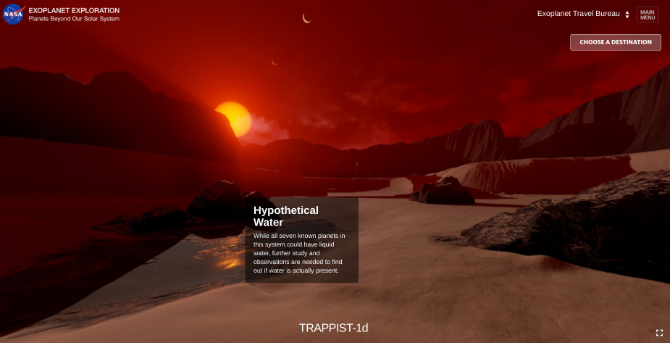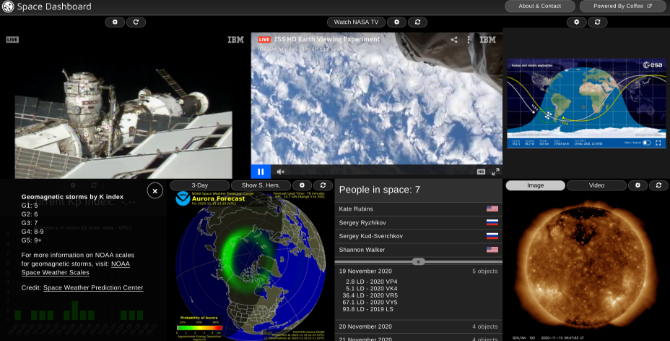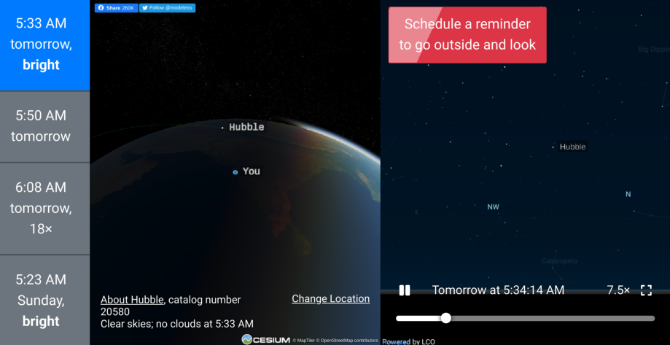Space is fascinating. If you have a casual interest in the great beyond or are a regular intergalactic explorer, these sites will give you a taste of space like never before.
There's something indescribable about why space exploration captivates us the way it does. Maybe it's the allure of the unknown. Maybe it's about finding alien life and knowing we aren't alone. It all boils down to expanding our understanding of the ways of the universe. Some people capture it through incredible documentaries about space. Others make websites that celebrate the cosmos in ways you never expected.
1. Exoplanet Travel Bureau (Web): Virtually Travel to a New Planet
You know the planets that revolve around our Sun. Any planet that spins around another star is an exoplanet. Step out of our solar system to see what other planets might look like with NASA's interactive Exoplanet Travel Bureau.
You can explore seven different alien worlds, all of which have a poster and an interactive view of what it's like to stand on its surface. It's not an actual video, of course, but an artist's colorized recreation of what the planet is likely to look like. You can pan around like Google Street View, and click interactive elements to learn more about the exoplanet.
If you like this, you should also check out NASA's Galaxy of Horrors. These are small educational pieces on some of the strangest parts of the universe, such as a giant planet where it rains glass. Similarly, visit the Universe of Monsters to discover exoplanets that might sustain some of the popular monsters from human lore.
2. Space Dashboard (Web): What's Happening in Space Right Now?
A space enthusiast much like yourself cobbled together a neat website for all current space-related activities. Space Dashboard is a one-stop shop for a bunch of things, namely:
- Live-stream straight from the International Space Station.
- NASA TV, one of the best live-streaming webcamsaround the world.>
- The current position of the ISS above the earth.
- Current geomagnetic storms by K index.
- Current day-night breakup of earth, and space-based weather predictions.
- A current view of the outer atmosphere of the sun, its hot flare plasma, and corona.
- How many people are in space right now, and who?
- Near-earth objects today and over the next few days.
- Current status of the Deep Space Network.
The Space Dashboard is a fantastic website to run on your second screen to keep a general eye on what's happening out there. And once in a while, you'll see something cool from the ISS too.
3. Supercluster (Web): The World's First Astronaut Database
Supercluster created the world's first astronaut database that you can browse and search. You can now see all of the 582 humans who have broken the surly bonds of Earth and reached for the stars.
Each profile has their name, mission, and statistics like the number of missions they've been on, how many days they spent in space, and how many spacewalks they did. You can filter or sort the database by gender, nation, mission, launch order, and spacecraft.
It's a fascinating piece of work, and you might find yourself hopping from astronaut to mission to another astronaut, down a rabbit hole. The astronaut database will eventually expand to include every living thing that ever leaves earth.
Supercluster is a great website for space nerds anyway because of all its other resources. The articles and stories provide interesting insights into how space exploration works. You can also track all launches on the website. The YouTube series "Supercluster Explains" is a must-watch for short animated videos illustrating some of the basics of space.
4. TruSat (Web): How to Track Satellites and Create an Eco-Friendly Map
There are almost 6,000 satellites in space, circling the globe for various purposes. Often, satellites crash to create space debris or go off their path due to galactic circumstances. TruSat is an open-source online community to protect space from getting overcrowded.
The website has the internet's best free guide to track satellites from the Earth, no matter where you are. It's accessible for complete beginners, and you don't need any fancy equipment either. Along with that, TruSat will also teach you how to take a photo or video of a satellite with your smartphone, which you can then submit to the database. You'll also need a great astronomy app like Sky View on your phone.
When so many people around earth submit these trackings, we get a clear chart of a satellite's trajectory. As long as it's on course, space is a more environmentally-friendly place.
5. See a Satellite Tonight (Web): Find Out When You Can See Satellites Without Telescopes
TruSat might be a bit hardcore for some users. See a Satellite Tonight (SAST) is the easier app to know when a satellite will pass over you in the night sky and be visible to the naked eye.
Fire up SAST and grant it access to your current location. In a minute, you'll get a list of a few upcoming satellite pass-bys with timings noted in your local time zone. The app also shows two helpful animations so you don't miss it.
The first animation is a view of the Earth from space, showing the trajectory of the satellite over your current location. The second animation demonstrates how it's going to look from where you are, looking up at the night sky. It'll prepare you for what to expect.
SAST gives you the ability to quickly schedule reminders to check these satellites, either through calendars or browser notifications. You can also look up additional info about any satellite on the website through Wikipedia links.
Pro tip: Beginners should look for satellite chains like Starlink-10 to pass overhead. Such multiple satellites become easier to spot.
Go Beyond NASA
For the longest time, NASA was the final word in space exploration. But the intergalactic landscape is changing slowly. Private players have entered the space race, and international collaborations like the ISS are in vogue. More and more, it makes sense to look beyond NASA if you're a space fan.
Sure, NASA still makes great apps and experiences like the Exoplanet Travel Brochure above. But these other sites and apps make a clear case for expanding one's horizons. At a time when anyone can build and launch a satellite into outer space, the internet will show you different ways of exploring space like never before.





